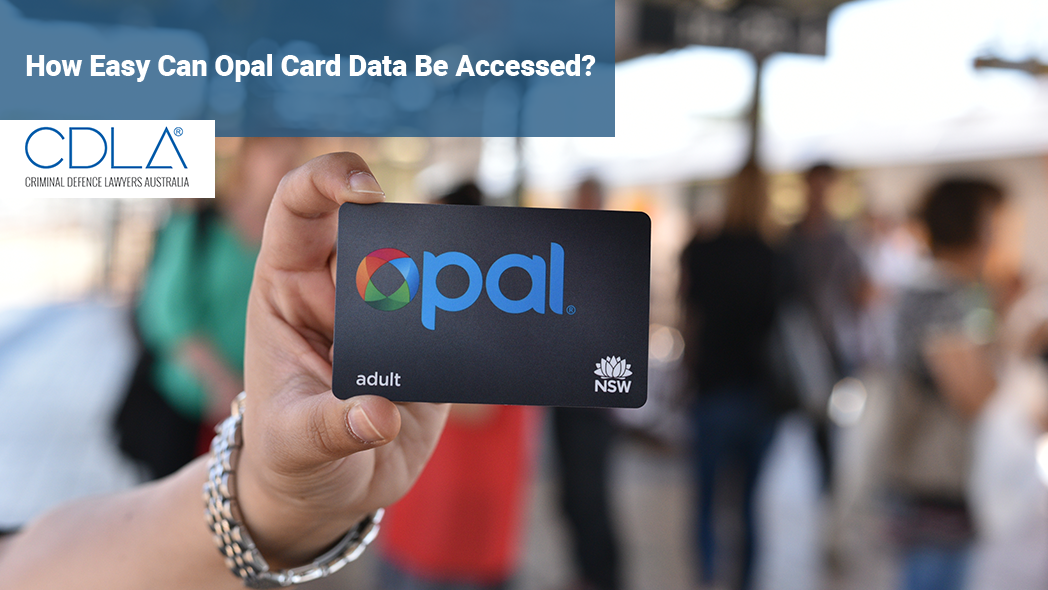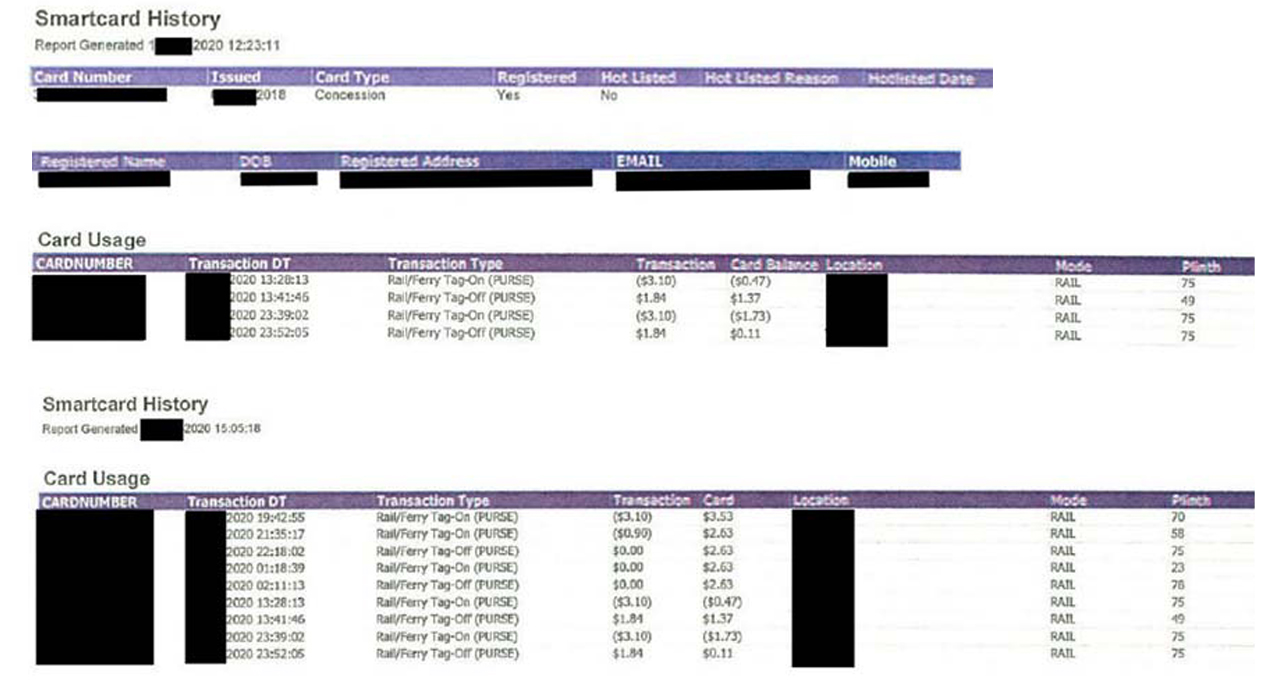Share This Article
Image credit: Singh_lens
Jimmy Singh and Poppy Morandin.
Can police access your opal card data without a warrant in NSW?
New South Wales and federal law enforcement agencies are able to access opal card history, opal card activity and opal card travel records history containing personal details including home addresses of thousands of commuters through Opal card data.
As many would know, the Opal card is a pay-as-you-go system that began in 2013, enabling transport on public trains, buses, and ferries across New South Wales.
Opal cards were initially created to save travellers’ time and money when utilising public transport by not having to queue in lines to purchase tickets.
Registered Opal cards contain personal details such as a persons’ first and last names, addresses, details of the preferred contact method, date of birth, and use and travel history.
Furthermore, concession cardholders also have information about the identification they used to prove their entitlement.
This includes information regarding TAFE or tertiary education enrolment and approved Centrelink documentation.
Personal sensitive data from opal card information landing in the wrong hands can lead to serious white-collar crimes, including Centrelink payments fraud offences.
Opal Card History and Data Disclosure
Your opal card data containing all of your opal card history, personal information and preferred method of travel can be accessed by NSW Police or any other law enforcement agency via a variety of methods.
For example, Opal card data can be accessed by police with or without a warrant, or by a court-ordered subpoena, or from an existing agreement between Transport for NSW and the law enforcement body including NSW Police.
Opal card data has been accessible without a warrant by police and other government agencies since mid-2014.
Similar powers have been used in other Australian jurisdictions such as ‘Go’ cards in Queensland, ‘MyWay’ cards in the Australian Capital Territory and ‘Myki’ cards in Victoria.
The Opal privacy policy states that personal information or travel history may be disclosed to law enforcement for the investigation of an offence, enforcing criminal law, or to assist in locating a missing person.
Transport for NSW have commented previously that cardholder details would only be released under “strict” rules.
“Customers can be assured Transport for NSW may only disclose information to a law enforcement agency that is necessary for law enforcement purposes, for the investigation of an offence, for the enforcement of criminal law or to assist in locating a missing person,” explains a Transport for NSW spokesperson.
“Protecting people’s privacy is very important but if in some situations police need this data to help solve crime and protect the public then there is a responsibility to provide it.”
Additional governance mechanisms for disclosure of Opal information have been enforced to ensure information is only disclosed in relation to legitimate enforcement or investigation of serious offences where there is a public interest in such disclosure.
The mechanisms include:
- A ‘Memorandum of Understanding’ between Transport NSW and Police governing the exchange of Opal information,
- Limitations on the circumstances in which information will be disclosed and the amount of information that will be disclosed,
- Requirements that law enforcement agencies obtain the proper authorisation from an officer of Inspector level or above before requests can be submitted or considered, and
- Audit provisions.
Notably, the data may also be provided to law enforcement pursuant to a warrant or subpoena.
Below is an example of Opal Card Data Extraction:
Opal Card Register Details of Innocent People Revealed 200
Police can and have been handed the information of people who are not suspects (‘collateral cardholders’) when the person of interest’s identity is unknown.
The details may be handed over in situations where the police request details of all travellers who have used their opal cards at a particular period of time and place.
This may occur where the police have seen a suspect on CCTV but do not know their identity.
When trying to access information regarding collateral cardholders, requests will be deemed inappropriate if they involve the disclosure of “personal information of a significant number of collateral cardholders without good reason (e.g., more than seven)”.
The document also states that vague or broad requests should be denied, and that Opal data is not to be handed to police for “general intelligence” purposes.
It also cautions against providing volumes of data for a large window of time, except in special circumstances.
Statistics on Police Accessing Opal Card Data
Transport NSW figures show law enforcement agencies tried to gain access to Opal data 327 times in 2015 and were successful 96 times.
In 2016, there were a total of 608 requests, with more than a third of these granted.
The approval rate and rising numbers of requests raises concerns regarding the legitimacy of a majority of requests.
NSW police were responsible for the majority of requests, with the Australia federal police also making a few.
More than half the access requests sought personal information rather than just the travel history of cardholders.
Unregistered Opal Card
Individuals may choose not to register their Opal cards via the opal card register, thus not needing to provide their personal details.
The Transport NSW website provides the options of using an unregistered Opal card or Opal Single Trip Tickets if persons want to ‘travel anonymously’.
However, non-personal information relating to travel connected to an unregistered physical Opal card using the card’s Opal card number could be disclosed.
Criminal Defence Lawyers Australia spoke with Barrister, Jack Tyler-Stott about this issue.
Our Interview with Criminal Defence Barrister Jack Tyler-Stott
We recently interviewed ex-prosecutor turned criminal defence barrister Jack Tyler-Stott as to his experience in Opal card data privacy issues in the context of criminal investigations by police.
Mr. Tyler-Stott is someone our criminal lawyers Sydney team consults with and briefs in serious criminal cases.
Have you ever experienced Opal card data being used in a case you were involved in?
Yes, it was used to identify an accused in a sexual offence that was alleged to have taken place in a railway bathroom. The police were able to track the accused on the CCTV and identified the time at which he used his Opal card to enter the railway station.
The Opal cards used at the relevant entry around this time were collated. The cardholders names and other particulars were analysed, and the police narrowed the field and compared this information against drivers license photos held by the RMS. From this process, they identified the accused and attended his home address where he was arrested.
How can Opal card data be utilised in prosecution of criminal matters?
The use of Opal cards produces data that is generally admissible in proceedings as a business record. Data common to all Opal Cards is name, date of birth, email address, and phone number. Use produces records of times, dates, and places when one accesses and exits railway premises. It may also be linked to financial records.
The data may be used to establish the identification of an accused (as above) as well as being used to refute or confirm versions of a complainant, witness or accused.
Opal Card Data for Defence Lawyers to Prove Innocence
Opal card personal data information can actually be used both in prosecution and defence cases in the sense it can inculpate or exculpate an accused person in criminal proceedings.
It can be used by police to identify an accused person, and if can also be used by criminal lawyers to actually refute allegations of the identity of the actual perpetrator by establishing a strong alibi defence, which can end up getting criminal charges dropped early through negotiations.
Opal Card Login and Tracking
If you have a registered opal card, you can log in to your Opal account. Once logged into your Opal account, you can change your Opal card details, unlink an Opal card from your account, view history of your Opal card orders and update security information including your password, Opal PIN number and security questions and answers.
In addition, as a registered Opal cardholder, once logged in to your Opal card account, you also have access to your Opal card activity and can block your Opal card if lost, or check your balance, or transfer balance of funds in it.
Opal card tracking is easy. You simply login to your account here. But to do so, you must be registered. You can register your Opal card online.
If your Opal card is registered, you can access up to 18-months of your Opal card activity. If you have a stored payment card on your account, you can top up your account manually, or you may set it up so that it does this automatically.
Opal Card Reader and Tracker
As an Opal card is a digital device, its data is also stored digitally. As your every trip is tracked digitally, it is all stored in your Opal card reader and this data can be used to provide you with live updates on how full or empty your bus is, in addition to checking your balance and commute activity.
This allows you to know whether you will end up having to stand in the bus during your trip. The TripView app now tells you how full your buss is before arriving to pick you up at your bus stop. This change arrives due to an update by Transport for NSW, utilising Live Opal card data into TripView to give you real-time information.
There are about 500,000 Sydney commuters who travel by bus on a daily basis.
Paper tickets have ceased completely since August of 2016. Opal card readers store and proved data which allows you to have more control in the way outlined earlier. While this raises concerns about data privacy, especially when NSW Police are able to track your commute by accessing your Opal card data without a warrant. It also has many other benefits of providing you with a less time consuming easier commute.
Opal Card Rules
Here is a short summary breakdown of the Opal card rules you need to know.
- Only one person can be assigned to an Opal card, a linked device or contactless payment.
- Depending on the type of card you use and mode of transport, there are minimum balances when travelling with an Opal card.
- You have to carry proof of entitlement card when travelling on Concession and Gold senior or pensioner Opal cards. If you are an eligible secondary student travelling on a Child or youth fare, you must also carry a proof of entitlement card.
- If you have a change of concession status, you must ensure that you are travelling on the correct fare.
- You must tap on when you get on your vehicle of transport in order for your trip to be valid.
- You must tap off when you leave the vehicle of transport to avoid being charged a default fare. If you forget to tap off, you have one hour to return to tap off.
- There are max journey time limits between tapping on and tapping off. If you go past the time limit, you can be charged for 2 fares when tapping off.
Click here for the formal Opal terms of use.
Opal Card NSW Contact
To make enquiries about your Opal account, you can simply log into your Opal account and select the “Opal account enquiries” button online to submit a feedback or enquiry form. Your feedback or enquiry is connected to your Opal account if you have a registered Opal account. This will fast track a response.
If you are an unregistered Opal cardholder, you may complete the feedback form online. The Opal Customer Care will reply to you in due course. For assistance in completing this form you can call the Opal Customer Care on 13 67 25.
There are a variety of types of Opal cards available, including, adult Opal cards, Child/Youth Opal cards, Concession Opal cards, Gold Senior/Pensioner Opal cards, School Opal cards, Free Travel Opal cards and Contactless Payments.
If you want a Child/Youth Opal card, you can get one over the counter from an Opal retailer. These include a convenience store, or newsagency. Other types of Opal cards can be applied for online.
While there is no charge to get an Opal card, you must top it up to a minimum of $20 for an adult card, $10 for a child or concession card. This only applies when topping up using retailers or top up machines. If topping up online, minimum top up amounts include $10 for adult cards, and $5 for child or concession cards.
Who Can Request Information from Transport NSW?
Generally, anyone can access government information via the Government Information (Public Access) Act 2009 (GIPA Act). This law required Transport NSW and any NSW Government agency to be transparent by providing public access to information unless there’s an overriding public interest against disclosure.
Information may also be accessed informally by making an information request to Transport for NSW. Transport NSW will then determine whether to provide you access to the requested information after considering the nature of the information. They may also provide access subject to conditions.
You can apply for access to your own information from Transport NSW by making an online application for information. You can make the online application here. When making this application, you will be asked to verify your identification by producing certain types of ID, including drivers’ license, current Australian passport etc. When attaching relevant identification documents, each scanned copy must be certified. You can certify documents via a JP, lawyer, doctor, teacher, or pharmacist.
Fees for making requests for information from Transport NSW range from $30 to $40.
Some types of information you may also request from Transport for NSW include CCTV footage. Generally, most footage is kept for between one to two weeks before it gets deleted. Any public member can request access to CCTV footage that Transport agencies hold. To do this, you can make a written request for footage to information@transport.nsw.gov.au, or post it to Information Access Unit, Transport for NSW, 7 Harvest St, Macquarie Park 2113.
If footage is found, then Transport NSW will contact you with notification of this with the option to then access it via the Government Information (Public Access) Act 2009 (GIPA Act). This application carries a $30 application fee. You complete and lodge the request for CCTV footage form from here.
Is Consent Required for Transport NSW to Release your Opal Card Data to Authorities?
Your opal card data personal information is collected and retained under the Opal Ticketing System. Your personal information is kept for purposes of managing and operating the Opal Ticketing System, supporting the system’s responsibilities for coordination and policy development for transport, transport services and transport infrastructure, according to clause 3.2 of the Opal Privacy Policy.
As part of its policy, the data will be shared with contractors engaged for the Opal Ticketing System in order for the system to function. In addition, your data can also be disclosed to third parties with customer consent, or in any of the following circumstances in compliance with the Privacy and Personal Information Protection Act 1998 (NSW) (PPIPA) without your consent:
- Financial institutions
- Other Government agencies
- Passenger transport agencies
- On-Demand Transport Operators
- Research Organisations
- Revenue Protection
- Law enforcement i.e. investigation of criminal offences by NSW Police or AFP; for missing persons; where there is a public interest in disclosure via a Memorandum of Understanding between TfNSW and NSW Police, Business Rules etc.
- Requirement by law i.e. warrant or subpoena
- Threat to life or health
- Contactless Payments
Similar provisions apply in relation to obtaining personal data information from financial institutions such as Banks.
Unregistered Opal Card
Customers can obtain adult or Child/Youth physical opal cards without registering them. This can be obtained from participating retailers or customer service centres. Getting an unregistered opal card does not require you to reveal any personal private information. Only registered Opal cardholders can access the personalised services and facilities enabling them to access information on activity, and manage payments etc.
An unregistered Opal card can be registered anytime. You may do this online to then have access to the services and facilities outlined earlier.
For unregistered Opal cards, the Opal Card Ticketing System will retain a record of the Opal card number and travel associated with it. If the card is topped up with cash, no personal information about you nor any record of your identity is retained.
In a criminal investigation, there can be a legal requirement to reveal the Opal Channel through which an unregistered physical Opal card was obtained and its travel history. This information can then be matched and compared with other evidence for example of CCTV footage of customers by law enforcement agencies to be used in court. This is a more difficult process to prove things like identification than doing this with a registered Opal card. Examples of a legal requirement to disclose include warrants or a subpoena (outlined earlier).











